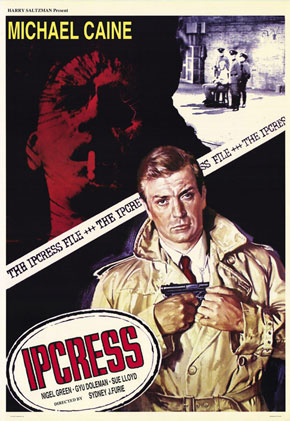
Baseball's Active Leaders, 2023
What Trump Said When About COVID
Recent Reviews
Everything Everywhere All at Once (2022)
Black Panther: Wakanda Forever (2022)
Doctor Strange in the Multiverse of Madness (2022)
Spider-Man: No Way Home (2021)
The Cagneys
A Midsummer Night's Dream (1935)
Something to Sing About (1937)
Angels with Dirty Faces (1938)
A Lion Is In the Streets (1953)
Man of a Thousand Faces (1957)
Never Steal Anything Small (1959)
Shake Hands With the Devil (1959)
The Ipcress File (1965)
If James Bond films are about the over-the-top explosions — sexual and otherwise — of international espionage, then The Ipcress File, a British film released in 1965, is about its bureaucratic banality. Pussy Galore? Not likely to show up in your typical B-107.
Written by:
Bill Canaway
James Doran
from the novel by Len Deighton
Directed by:
Sidney J. Furie
Starring:
Michael Caine
Nigel Green
Guy Doleman
Sue Lloyd
Gordon Jackson
BAFTA Nominations:
Best Actor
Best Screenplay
BAFTA Awards:
Best Film
Best Cinematography
Best Art Direction
Quote:
"The Americans have put a tail on Palmer."
"How very tiresome."
Michael Caine plays Harry Palmer, an agent whose B-107 characterizes him as "insubordinate, insolent, with possible criminal tendencies." We first see him making a morning espresso — the realm of gourmets in 1965 — and arriving late for work. He likes birds, dislikes paperwork and has a tendency to smirk. When Ross (Guy Doleman), his chief at the Ministry of Defence, transfers him to another outfit, he warns him about his future boss. "Dalby works his men," he says blandly. "And he doesn't even have my sense of humor." "Yes, sir," Palmer replies dryly, "I shall miss that, sir."
This transfer has a meet the new boss, same as the old boss feel to it, for both men meet Palmer while staring out their windows, and, without turning, chastise him for not closing the door behind him. Dalby's outfit is in charge of investigating Britain's "brain drain": 126 government scientists have left their positions over the last two years, many without rational reason. The most recent, Radcliffe, was kidnapped and one of Dalby's agents killed. One gets the feeling that among Dalby's button-down agents, the relatively rebellious Palmer will be the first to track him down, and he is, but again through bland, bureaucratic means: he rings up a Scotland Yard friend, finds out the chief suspect has been ticketed many times in a particular area of London, and stakes him out. When they meet — in a library — he offers money for Radcliffe; when he has to fight his henchman, it's a weak affair compared with the crisp, roundhouse punches we see in movies.
Ipcress helped make a star out of Caine, while his bosses, the character actors Guy Doleman and Nigel Green, are wonderfully stiff and dry. But it's the camerawork that really recommends the movie. It's slightly jarring, forever off-kilter. Objects in the foreground often obscure the relevant action. Things are hidden in plain sight. Best, despite focusing on the bureaucratic blandness of counter-espionage work, the film is exciting. Most early Bond films pale when compared with more recent examples, because Bond is all about action and the action comes more quickly now. Ipcress, in contrast, is about character and class. It hardly seems dated at all.
—May 8, 2001
© 2001 Erik Lundegaard







